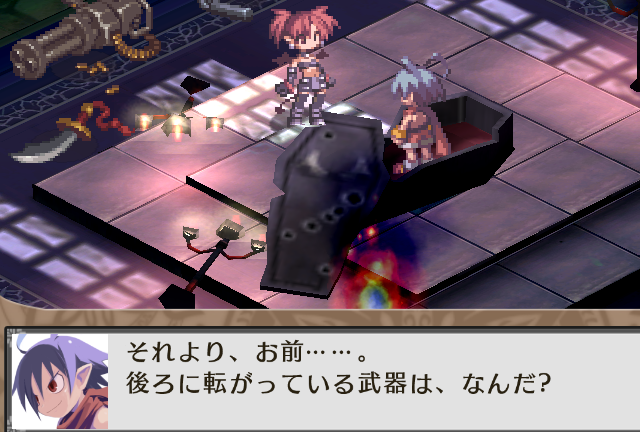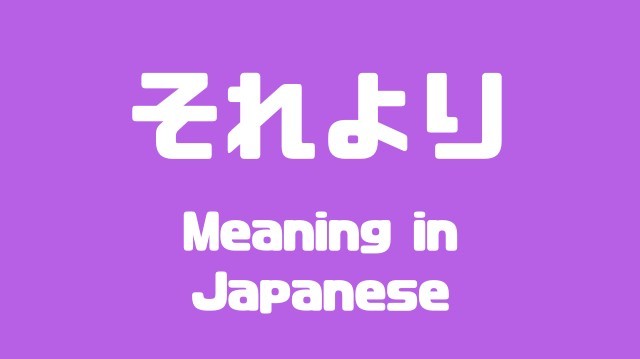When you’re listening to a variety of Japanese podcasts or anime, you tend to run into a lot of the same words and phrases over and over again. One of those short phrases is sore yori, which is spelled in Japanese as それより.
Today we will ask and answer the question, what does sore yori mean in Japanese?
After that I’ll provide some additional example sentences so that you can begin to really get a feel for how it works and is used in the language.
The Meaning Behind the Phrase
If you simply pop the phase それより into Google Translate it will provide you with the English translation “Than it” which kind of gets you close to the real meaning of it, but unfortunately isn’t quite right.
The reason for this is because それ means “that” and is very often used to refer to something abstract, such as a situation or an idea, which can be referred to in English as “it” many times.
Then we have the Japanese particle より which has many potential meaning, but in this particular case means “than” and is used for the comparison of two different things.
So now let’s get to what それより really means. It is a phrase that is hard to translate directly into English because it can change slightly depending on the context of the situation. But essentially it is used when changing the subject suddenly during a conversation.
Here are a couple of English phrases that could all be used for それより:
- aside from that…
- rather than that…
- more than that…
- yes, but besides that…
In this way you are setting up the information that you are about to present to the other person, in a way as to let them know that it is more important (or relevant, exciting, etc.) than what they’ve just said.
For example, if your friend said you need to leave early to make it on time, you might start your reply with それより to say, “rather than that, I’m just going to drive fast.”
Remember, this phrase is used to change the subject to something else. Even if you totally agree with the point that the other person is making, you could then use それより as a way to acknowledge what the other person has said, and then more on to what you need to say.
This grammatical structure is what’s known as a “conjunction” which is something that’s used to connect two clauses or sentences. However, I personally feel that even knowing that particular piece of information and what it means isn’t really all that helpful when it comes to using the language.
After all, what most people want is to be able to hear a phrase (or read it) and to understand the meaning behind it right away.
So generally the best way to do that is to first learn what the words and phrases mean, which we just finished doing, and then see lots and lots examples of it in action so that you can begin to really get a feel for it. That’s what we will go over next.
In this way you can understand what’s being said (it’s comprehensive) and then through repeated exposure you can lock it down at an unconscious level for instant usage.
Example Sentences for Practice

Alright, so here are some simple example sentences to help show how それより works.
Want some beer? | Naw, rather than that I’m going to have wine.
ビールが飲みたい?|いや、それよりワインを飲む。
(biiru ga nomitai? | iya, sore yori wain o nomu.)
So this first example is one of the more common ways that this phrase is used. Someone makes a suggestion, or some sort of statement, and you use それより to change to something else. This one changes from drinking beer, to drinking wine.
Aside from that, we must also work today.
それより今日も働かなければならない。
(sore yori kyō mo hatarakanakereba naranai.)
In this response, it seems as if someone has suggested an activity which is acknowledged, but then kind of put to the side as a reminder of today’s work is brought up.
In these last two examples, それより is used to change the topic, and in a way turn down what ever was suggested or mentioned in the first sentence. However, there is also another way to understand それより.
It can be used when comparing the qualities of two objects, with the first item mentioned to be lacking in some sort of way.
In this next example, let’s say that two people are looking for the smallest hat they can find. Person 1 picks up a hat and shows it to Person 2 and asks if it will suffice. Person 2 then says that the hat they have found is smaller, and therefore a better choice.
P1: How about this one? | P2: More than (the hat you’re holding) this hat is smaller (and therefore better suited).
P1: これはどう? | P2: それより、こっちの帽子の方が小さい。
(P1: kore wa dō? | P2: sore yori, kocchi no bōshi no hō ga chiisai.)
An Interesting Note
One of the interesting things about それより is that is uses それ which is a part of the kosoado group of words. I won’t go into too much detail on that here, since it would take too long, but basically speaking words that belong to this group are often used in similar situations.
Here is a short list of それ’s kosado group to show what I mean:
- これ (kore) = this.
- それ (sore) = that.
- あれ (are) = that thing over there.
- どれ (dore) = which?
However, in this particular grammar pattern of それより you would think that you can switch out それ for any of the above mentioned kosoado words and it would then make a new grammar pattern that could be used.
However, none of these other options are really ever used. In 99% of cases, you will only see それ combined with より.
What this means is that you only need to focus on learning それより as a single, complete pattern and that will be enough.
But what it also means is that you shouldn’t try to construct a new Japanese sentence using any other kosoado words in combination with より since it will come off as awkward in Japanese, if not downright incorrect.
What sentences have you seen sore yori used in? What other questions do you have about this phrase?
Further Resources for Learning Japanese:
#3 Get My eBook (Secrets to Learning Japanese) for Free

またね!
